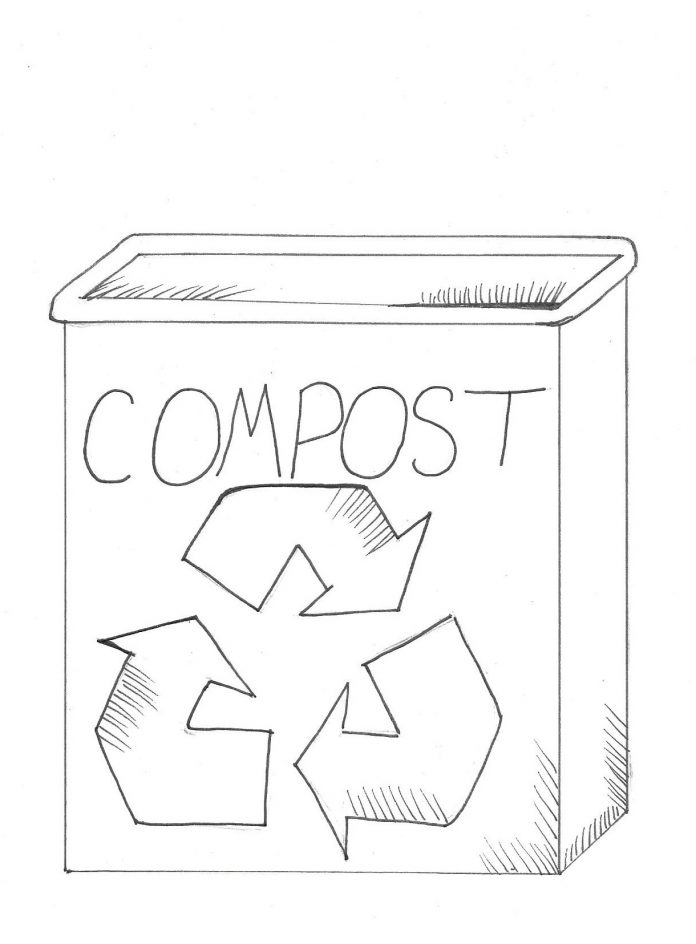The College of William and Mary prides itself for its composting program, which was established in 2010 and is one of the first among universities in Virginia. The program was the initiative of three sustainability student interns in collaboration with the College’s Dining Services with the intent to eliminate 40 percent of dining hall waste. This waste is picked up by Natural Organic Processes Enterprise and is transported to a facility in Waverly, Virginia for composting. In the years since, this effort has been continued with the help of the Sustainable Dining Interns and other administrative support.
In March 2019, AMP collaborated with the Sustainable Dining Interns to produce an event in which students were encouraged to bring recycled jars and transform them into dorm-friendly composting jars. More recently, there has been a push to further incorporate composting into the sustainable practices of the College, including a revamp of public composting bins behind the Sadler Center. The catering services of the College also allow organizers to request composting for events held on campus. And, of course, for those who frequent Marketplace, sorting trash into the various bins — composting included — is a ritual at the end of every meal. All these attempts aside, the question that should always be asked is, has enough been done to promote and ensure composting at the College? When the health of the environment is in question, the answer is almost always ‘no.’
Nonetheless, the work of the Sustainable Dining Interns and the College’s Dining Services must be commended. Instilling sustainable practices and values now will carry with students for the rest of their lives. Active involvement by large portions of the student population, even if small, is vital to the creation of a sustainable campus culture. Sorting through trash, for example, to separate out compostable components is an everyday task that forces students to consider the implications of consumption.
So, how can the College improve upon this positive momentum? Putting composting at the forefront of any meal and incorporating it into students’ daily lives subconsciously increases its pertinence. Furthermore, collaborations among Dining Sustainability and other branches of the College — as with the aforementioned AMP event — can make composting an interdisciplinary phenomenon. Composting is not innately separate from all other aspects of life, so it is time to treat it as such, rather than a separate event.
Expanding accessibility and visibility of composting on campus is another basic step that can be improved campus-wide. For those who are aware of the College’s composting efforts, it is easy to participate. However, many students may be unaware for reasons as simple as a lack of information. Presenting information such as where composting bins are available, what materials are composted on campus, and how students can get involved can expand interest, awareness and involvement. As of this writing, only two truly public compost bins are available on campus. If composting is to become a truly priority across campus, more compost bins must be placed where students are able to access and use them frequently. Placing bins near dorms and encouraging students to empty compost as they empty trash or recycling can decrease the compostable material that ends up in landfills.
Additionally, for the school-year of 2019-2020, each student paid $21.50 as a Green Fee — an initiative started by the College in 2008 to provide financial support to campus sustainability initiatives, student research and a sustainability endowment. Compost bins would fall under improvements that can be made using this Green Fee, and adding more bins would not be a significant financial burden.
With the tools, financial support and passion available, the College’s composting program can only progress forward. In the Sustainability Plan for the fiscal years 2019-2024, the College committed to expanding upon current initiatives. Two commitments made were to explore a pizza box initiative for the campus composting program by 2019 and divert consumable food and compostable waste from the landfill by 2022. In the Address from the President that was included in the plan, President Rowe highlighted the composting process as one way in which sustainability is “woven into the fabric of our university.”
It is time that the College proves it is ready to face the challenge. It must not let progress stall at a time when environmental initiatives are most needed. It takes the commitment of all students and faculty to ensure that composting is a reality for years to come.
Email Alexandra Byrne at
ambyrne01@email.wm.edu.

